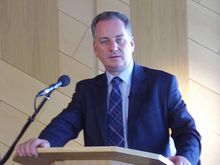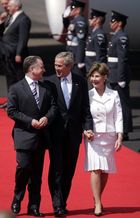Jack McConnell
| The Right Honourable Jack McConnell MSP |
|
 |
|
|
First Minister of Scotland
|
|
| In office 22 November 2001 – 16 May 2007 |
|
| Monarch | Elizabeth II |
|---|---|
| Deputy | Jim Wallace (1999-2005) Nicol Stephen (2005-2007) |
| Preceded by | Henry McLeish |
| Succeeded by | Alex Salmond |
|
Leader of the Scottish Labour Party
|
|
| In office 22 November 2001 – 15 August 2007 |
|
| Preceded by | Henry McLeish |
| Succeeded by | Wendy Alexander |
|
Member of the Scottish Parliament
for Motherwell and Wishaw |
|
| Incumbent | |
| Assumed office 6 May 1999 |
|
| Preceded by | Constituency Established |
| Majority | 5,928 (22.7%) |
|
|
|
| Born | 30 June 1960 Irvine, North Ayrshire, Scotland |
| Political party | Scottish Labour Party |
| Spouse(s) | Bridget McConnell |
| Alma mater | University of Stirling |
| Profession | Teacher |
Jack Wilson McConnell (born 30 June 1960) is a Scottish Labour politician, who has been the Member of the Scottish Parliament for Motherwell and Wishaw since 1999, and served as the third First Minister of Scotland from 2001 to 2007; to date, he is the longest serving First Minister in the history of the Scottish Parliament.
McConnell became an MSP in the first elections to the Scottish Parliament in 1999, later holding the positions of Finance Minister, and Education Minister. He became First Minister upon the resignation of his predecessor Henry McLeish, and led the Scottish Labour Party to its second election victory in the 2003 election.
Contents |
Education and career
McConnell was born in Irvine and raised on a sheep farm near Lamlash on the Isle of Arran. He attended Arran High School and later went on to study at the University of Stirling, graduating with a BSc Dip Ed. He was also President of the Students' Association[1].
After graduating in 1983 he began work as a mathematics teacher at Lornshill Academy in Alloa, Clackmannanshire (a position he retained throughout his subsequent council service).
Early political career
McConnell's political career began with his election to Stirling District Council. McConnell served on the council for eight years, while retaining his job at Lornshill. He served as Treasurer from 1988 until 1992, and was the Leader of the council from 1990 to 1992.
McConnell became the General Secretary of the Scottish Labour Party in 1992. His major breakthrough was in his handling of the 1997 General Election success, where Labour attained a large overall majority victory over the Conservatives. Together the Scottish Labour Party, the Scottish Liberal Democrats, and the Scottish National Party eliminated every seat the Conservatives held in Scotland. In 1998, he served as a member of the Scottish Constitutional Convention where he pioneered the Scottish devolution referendum success, establishing the Scottish Parliament.
Member of the Scottish Parliament
Finance Minister
McConnell was elected an MSP in the first Scottish Parliament elections in 1999. He was appointed Minister for Finance in the new Scottish Executive by then-First Minister Donald Dewar.
One of his first moves as Finance Minister was to establish the budgeting procedures for the new Scottish Executive, including publishing a consultation document asking the public and MSPs how the budget should be spent. His department also passed the Public Finance and Accountability (Scotland) Act 2000 through Parliament which set out the finance and auditing procedures of the Executive.[2]
Education, Europe and External Affairs
On 11 October 2000 Donald Dewar died of a brain haemorrhage. After the Labour leadership intervened to stop the Enterprise Minister Henry McLeish being appointed Dewar’s successor without a vote, Jack McConnell decided to stand in the leadership contest.
The election was held on Saturday 21 October, only 72 hours after Mr Dewar’s funeral and the surprise result saw Jack McConnell win 36 votes to Henry McLeish’s 44 votes.
McLeish appointed him Minister for Education, Europe and External Affairs.[3] Some analysts considered this post to be a "poisoned chalice", as he would be required to resolve both a crisis in the Scottish Qualifications Authority over exam marking, and pay disputes with the teaching unions.[4]
In August 2000, prior to Jack McConnell’s appointment as Education Minister, Scotland's national exams system was plunged into chaos when 5,000 students get the wrong exam results.
Immediately following his appointment as Education Minister Jack McConnell appointed a new board for the Scottish Qualifications Authority (SQA) and introduced significant changes to the way the agency worked. The marking of the 2001 exams was a success.
He introduced a new pay and conditions package for Scottish teachers and the largest ever investment in schools buildings. He also established the Scottish government’s first external relations and European strategy.
Election for First Minister
Henry McLeish resigned as First Minister on 8 November 2001 over the Officegate Scandal, regarding the sub-let of his constituency office.
In the resulting search for a leader, McConnell was seen by many political analysts as the likely successor.[5]. McConnell quickly emerged as the only candidate and was elected First Minister by the Parliament on 22 November 2001 and formally appointed into office by Queen Elizabeth II on 26 November 2001.
First Minister
First term
A few days after his appointment, on 27 November 2001, McConnell carried out a reshuffle of the Cabinet, axing four Ministers: Angus MacKay, Sarah Boyack, Tom McCabe and Jackie Baillie, and demoting Susan Deacon (she later resigned rather than accept the new post offered to her).[6].
In February 2002, Scotland joined forces with the Republic of Ireland in a bid to host the 2008 European Football Championship.[7] McConnell was initially unconvinced that it was worth spending around £100 million on the tournament, however he later put his support behind the joint bid with the Irish. Although the bid lost out to Austria/Switzerland, McConnell later supported other attempts to land major supporting events including London's successful bid for the 2012 Olympic Games [8] and Glasgow's bid for the 2014 Commonwealth Games[9].
In December 2002 Mr McConnell launched his government's campaign against sectarianism.http://www.scotland.gov.uk/Publications/2005/04/2193449/34509
Second term

Jack McConnell was re-elected MSP for Motherwell and Wishaw at the Scottish Parliament elections. The Labour Party won 50 seats, the largest number, and formed a coalition with the Liberal Democrat Party which won 17 seats.
On 15 May Mr McConnell was re-appointed First Minster of Scotland and on the same day the Scottish government published A Partnership for a Better Scotland which set out the government’s priorities for the four year term.
Key achievements of Jack McConnell's administration include:
The Fresh Talent initiative, launched in February 2004, to encourage economic migration to Scotland and help tackle the country’s declining and ageing population.
A global campaign to promote Scotland as a place to live, work, study and visit was established on 1 July 2004
Project Scotland a national volunteering scheme for young people was set up on 11 May 2004.
Scotland became the first part of the UK to implement a ban on smoking in public places on 26 March 2006.
Scotland and Malawi signed an historic Co-operation Agreement on 3 November 2005.
2007 election
The Scottish Parliament elections of 3 May 2007 saw Jack McConnell re-elected as the MSP for Motherwell and Wishaw with a majority 5938 votes, representing 48% of the vote with a turnout of 50.3%. However the Labour Party was narrowly defeated by the SNP with the Nationalists winning 47 seats to Labour's 46, leaving the SNP far short of an overall majority in the Parliament.[10]
Alex Salmond declared that his party had the right to form an executive due to their victory in the popular vote. McConnell strongly disagreed with this statement, arguing that "There is no moral authority to pursue separation and moral authority in the parliament will only come through parties working together in the majority."[11]
After First Minister
On 15 August 2007, McConnell announced his intention to resign as Scottish Labour leader.[12]
He was appointed an adviser to the Clinton Hunter Development Initiative in Malawi and Rwanda in August 2007.
He was slated to take over as the UK's High Commissioner to Malawi in 2009, but was appointed by Gordon Brown in October 2008 as the Prime Minister's Special Representative on Conflict Resolution Mechanisms.
He is a UK Ambassador for Action for Children, and Fellow of the 48 Group Club, which promotes relationships between the UK and China, and an Ambassador for Pump Aid.
He remains the MSP for Motherwell and Wishaw.
On 28 May 2010 it was announced that McConnell would be made a Working Peer.[13]
Personal life
He is married to Bridget McConnell, and has two adopted children from that marriage, Hannah and Mark. Bridget is Chief Executive of Culture and Sport Glasgow, the UK's largest and most comprehensive cultural and sports charitable company. Hannah lives in London working for the British Council. Mark is a graduate of the University of Dundee, and is currently working as a teacher at Broxburn Academy teaching English.
See also
- Politics of Scotland
- List of Scottish Executive Ministerial Teams
- Bute House
References
- ↑ Scotland.gov.uk- Jack McConnell MSP
- ↑ Public Finance- "Edinburgh gives public say in £16.2bn budget"
- ↑ SE2783/2000- FIRST MINISTER ANNOUNCES NEW MINISTERIAL TEAM
- ↑ BBC News- Jack McConnell profile
- ↑ BBC News- "Search begins for new first minister"
- ↑ Edinburgh Evening News- "New look at the top as Jack swings axe"
- ↑ Scottish Executive news release- "Joint Euro 2008 bid goes ahead"
- ↑ London 2012-"Scots' First Minister 'Backs the Bid'"
- ↑ Glasgow City Council
- ↑ Timeline: Scottish elections 2007, BBC News, 4 May 2007.
- ↑ Scotsman.com: "Salmond opens talks to form new coalition to rule country"
- ↑ McConnell quits Labour leadership, BBC News, 15 August 2007.
- ↑ [1] Peerages, honours and appointments Downing Street, 28 May 2010.
External links
| Scottish Parliament | ||
|---|---|---|
| Preceded by Constituency Created |
Member of the Scottish Parliament for Motherwell and Wishaw 1999–present |
Incumbent |
| Political offices | ||
| Preceded by Henry McLeish |
First Minister of Scotland 2001–2007 |
Succeeded by Alex Salmond |
| Preceded by Sam Galbraith |
Minister for Education, Europe and External Affairs 2000–2001 |
Succeeded by Cathy Jamieson |
| Preceded by Office Created |
Minister for Finance 1999–2000 |
Succeeded by Angus MacKay |
| Party political offices | ||
| Preceded by Henry McLeish |
Leader of the Scottish Labour Party 2001–2007 |
Succeeded by Wendy Alexander |
|
||||||||||||||||||||||||||||||||